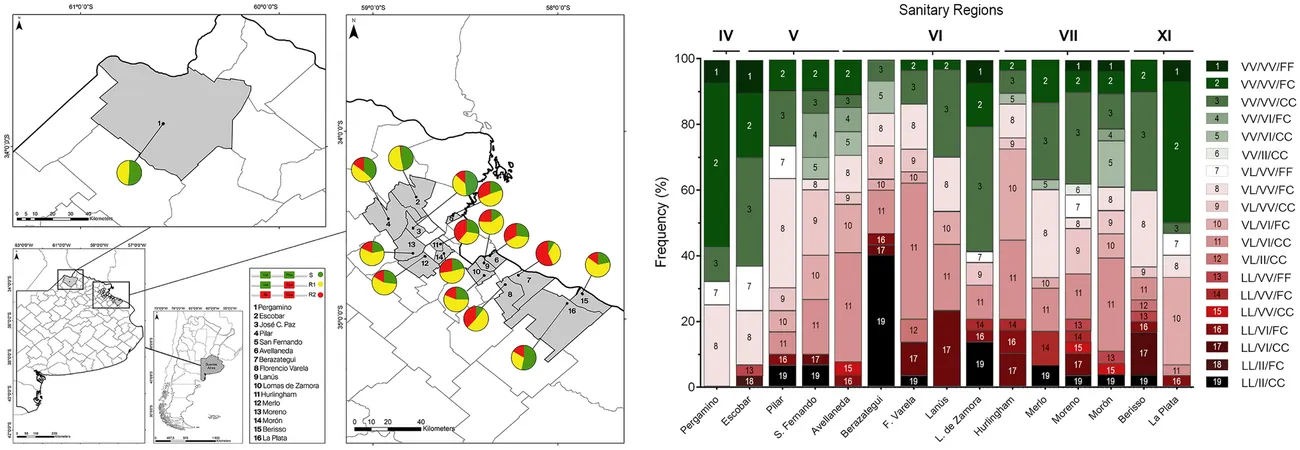
Rising Threat: Pyrethroid Resistance in Aedes aegypti Mosquitoes Detected for the First Time in Buenos Aires Province
2024-11-09
Author: Jia
Overview
Dengue has become an alarming health crisis in Argentina, particularly in Buenos Aires Province (BAP), the country's largest and most densely populated area. In recent years, dengue outbreaks have surged, with a staggering nearly 100,000 confirmed cases reported from 2023 to 2024 alone. Central to this issue is the Aedes aegypti mosquito, the primary vector for dengue and other arboviruses like Zika and chikungunya. To combat these outbreaks, authorities have relied heavily on pyrethroid insecticides. However, increasing resistance to these chemicals may undermine control efforts.
The Resistance Problem
The resistance of Aedes aegypti to pyrethroids is primarily linked to mutations in the voltage-gated sodium channel (VGSC) gene, specifically mutations known as knockdown resistance (kdr) mutations. In this groundbreaking study, researchers confirmed the presence of two significant kdr mutations—the 1016Ikdr and 1534Ckdr alleles—in the central region of Argentina for the first time, alongside the V410L mutation also observed recently. This identification raises serious concerns about the efficacy of pyrethroid insecticides in controlling mosquito populations, indicating a clear trend of resistance due to the frequent application of these chemicals.
Research Methodology
To assess the kdr mutations in Aedes aegypti, scientists collected a staggering 22,123 eggs through ovitraps deployed across 16 localities in BAP. Genotyping was performed on 522 adult mosquitoes using advanced techniques such as high-resolution melting analysis and Sanger sequencing. The results revealed a diverse range of genotypes, with 19 different combinations of substitutions identified, showcasing the genetic complexity of local mosquito populations.
Findings and Implications
The emergence of the 1016Ikdr and 1534Ckdr mutations coincided with a marked increase in dengue cases in the region, suggesting a direct correlation between pyrethroid usage and the development of resistance. Notably, the mutation V410L was found to be spreading across BAP, with higher frequencies reported in areas most impacted by dengue. Researchers argue that this resistance trend calls for urgent public health interventions, including the development of alternative vector control strategies that do not rely solely on pyrethroids.
Furthermore, the study emphasizes the need for concerted efforts between scientific communities and health authorities to design and implement effective insecticide resistance management strategies. As arboviral diseases spread, integrating resistance monitoring into control programs is crucial for sustainable public health solutions.
The Bigger Picture
The rise in pyrethroid resistance in Aedes aegypti mosquitoes poses a significant risk not just in Argentina but throughout South America, where dengue outbreaks have surged in recent years. Countries like Brazil and Paraguay also report alarming statistics, with a significant portion of the population affected. As health organizations scramble to respond to record cases, the implications of such resistance are grave.
This study serves as a clarion call for stakeholders involved in public health and vector control. It highlights the importance of adapting strategies to prevent further resistance, thus safeguarding communities from the looming threat of vector-borne diseases.
Stay alert! The mosquito that could ruin your summer plans is evolving. Will you be prepared to combat this rising threat?





 Brasil (PT)
Brasil (PT)
 Canada (EN)
Canada (EN)
 Chile (ES)
Chile (ES)
 España (ES)
España (ES)
 France (FR)
France (FR)
 Hong Kong (EN)
Hong Kong (EN)
 Italia (IT)
Italia (IT)
 日本 (JA)
日本 (JA)
 Magyarország (HU)
Magyarország (HU)
 Norge (NO)
Norge (NO)
 Polska (PL)
Polska (PL)
 Schweiz (DE)
Schweiz (DE)
 Singapore (EN)
Singapore (EN)
 Sverige (SV)
Sverige (SV)
 Suomi (FI)
Suomi (FI)
 Türkiye (TR)
Türkiye (TR)